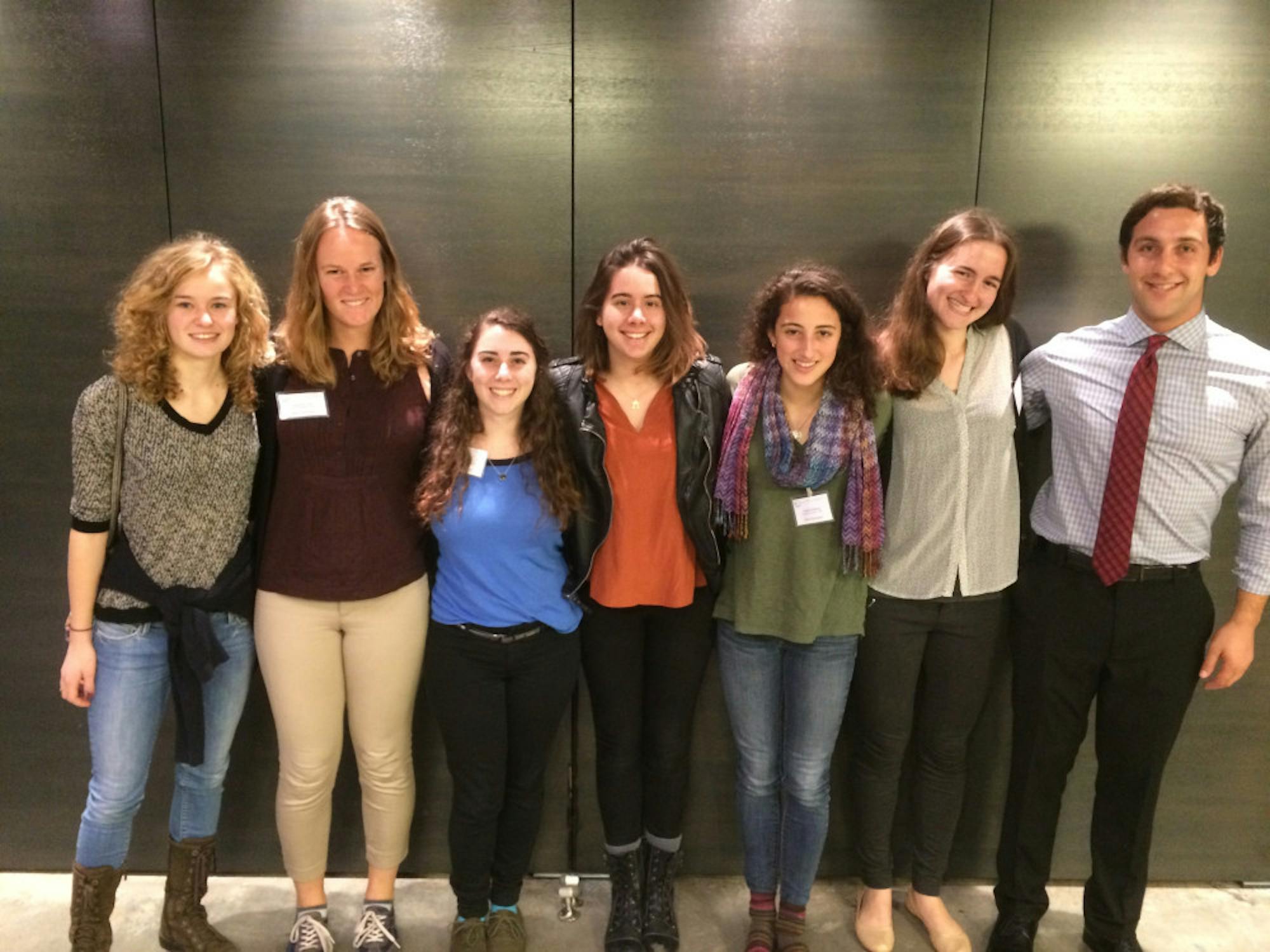Tufts participants in Generation Citizen (GC) helped coach middle and high school students at GC's second annual all-day Civic Tech Challenge at the Microsoft New England Research and Development Center on Nov. 7.
According to sophomore Julie Murray, Tufts GC outreach coordinator, Generation Citizen is a national nonprofit that focuses on increasing civic engagement by sending college volunteers into high school classrooms to teach action civics. The GC curriculum has been developed to solve community issues through government and give students the tools to become change makers, she said.
The nonprofit's curriculum is built from the "advocacy hourglass," in which students identify a focus issue, a root cause, a goal, a target person or group of influence and tactics for achieving the goal via political engagement with the targets, according to the GC website.
The Saturday event was a hackathon fundraiser in which students in the program worked with professional technology volunteers to enhance action projects they had been working on all semester with technology, according to Murray. The action projects they had been working on advocated for change in a significant local community issue identified by students, according to Microsoft's New England website.
Murray explained that the students learned “technology tools to make their action projects effective” and demonstrated how they can use technology to engage in the civic process by building a website, Facebook page, infographic, video or other platform to share their work.
In addition to working on their action projects, the students in attendance also participated in professionalism workshops, interviews, presentation practice and arts activities, according to Tufts GC Research Fellows Director Sophie Dulberg.
Tufts GC Democracy Coach Alex Mitchell said that 40 participants from the Josiah Quincy School met in the morning with their Democracy Coaches -- undergraduate program volunteers -- from Tufts, Boston College and Northeastern University, and approximately three technologists were assigned to their group to explain their project and goals.
Murray said that the students she worked chose youth homelessness as its focus issue, targeting Massachusetts Senators and Representatives to reach the goal of passing Bill H119. That particular bill was introduced to ensure accessible housing for children and has been in committee for eight years, according to Murray.
She said that the students in the group were split into two sections, with one focusing on communicating their message by creating a website and a Facebook page and the other focusing on why the issue was important, creating infographics on youth homelessness. The website included information about the bill and why youth homelessness is such a big issue in Boston, a petition and information about lobby day, according to Murray.
According to Dulberg, a junior, the technologists in the groups worked to create the materials they designed with the students. They also helped students in the group by compiling and presenting relevant data sets for their meeting with their target influencers, Murray said.
According to Mitchell, a sophomore, another class of seventh graders chose gun violence as their focus issue, and they split into two tracks at the hackathon to address different goals.
The first track used hackers to structure and follow coordinated mass youth outreach efforts to legislators, hoping that advocacy from youths would help influence the legislation. The group aimed to support and enhance the mayor and police commissioner’s outreach efforts to registered gun owners, Mitchell said.
The second track raised awareness about gun violence and rallied support for the Massachusetts legislature to revise the Tiahrt Amendment, a bill provision that restricts the release of information from the national firearms trace database in order to make it easier to track guns, according to the GC event presentation.
Together, the groups from the two tracks created a website where users are taken to separate information pages based on their gun ownership status, according to Mitchell.
Mitchell said that the students in the program knew a lot about many of the community issues that were discussed.
“[The whole day was] very kid-driven, as much of GC is," he said.
The event was not a competition, but final projects from the students were evaluated and scored by judges based on alignment to the civic change process, usability by young people and group collaboration during the hackathon, according to the GC website.
The event, which took place from around 8:30 a.m. to 6 p.m., was followed by a fundraising reception for the organization.
Dulberg said that she felt that a lot of innovation had gone on during the event.
“You spend the whole day inside, but there’s so much creativity and thinking," she said. "I left feeling like I accomplished something ... It got more people from the community involved in Generation Citizen, and certainly a lot [of] these projects will help with the kids in these classrooms getting their projects to be heard."
Mitchell said that the hackathon was a great opportunity for the students who were there.
“It definitely makes an impact on the kids," he said. "There’s this whole day outside of school where adults are coming to help them and create the tools that they need."
Dulberg explained that the organization's work is important because it recognizes kids' intelligence and creativity.
“It’s super important that they get heard and that they know that they can be heard," she said.
Correction: The print version of this article mistakenly said that students from the program who were at the event were all high schoolers, when students from seventh grade and over participated. In addition, it stated that there were over 1,000 students at the event, which is actually the number of students across Boston who have launched action projects. There were in fact approximately 40 students at the challenge itself. The article has been changed to reflect that.
Generation Citizen volunteers help with annual Civic Tech Challenge

Tufts students involved in the group Generation Citizen participated in the Civic Tech Challenge this past Saturday.





